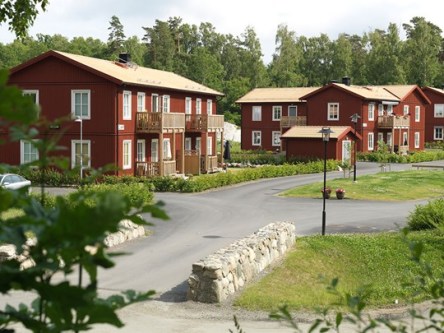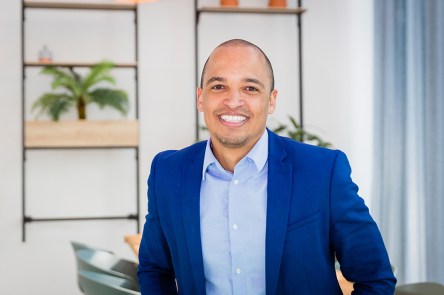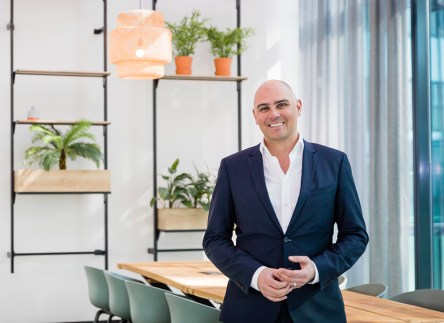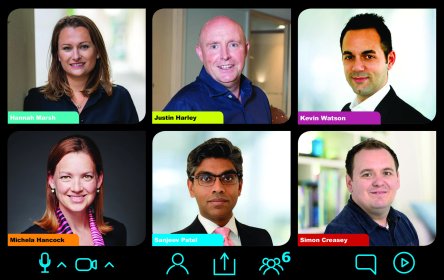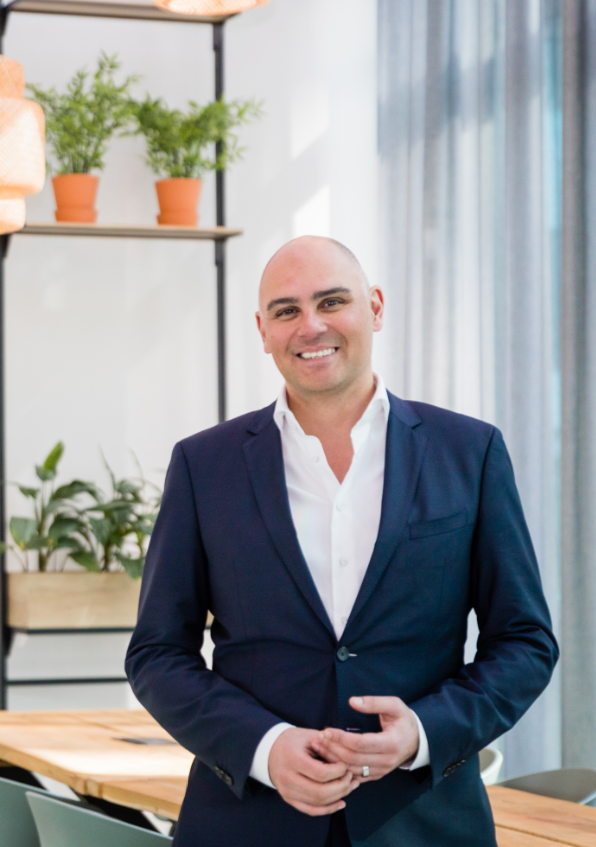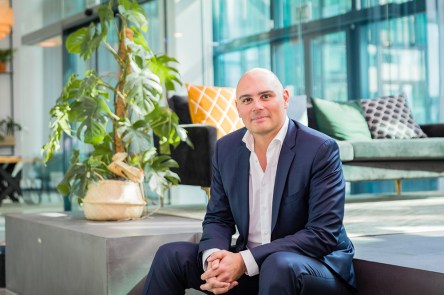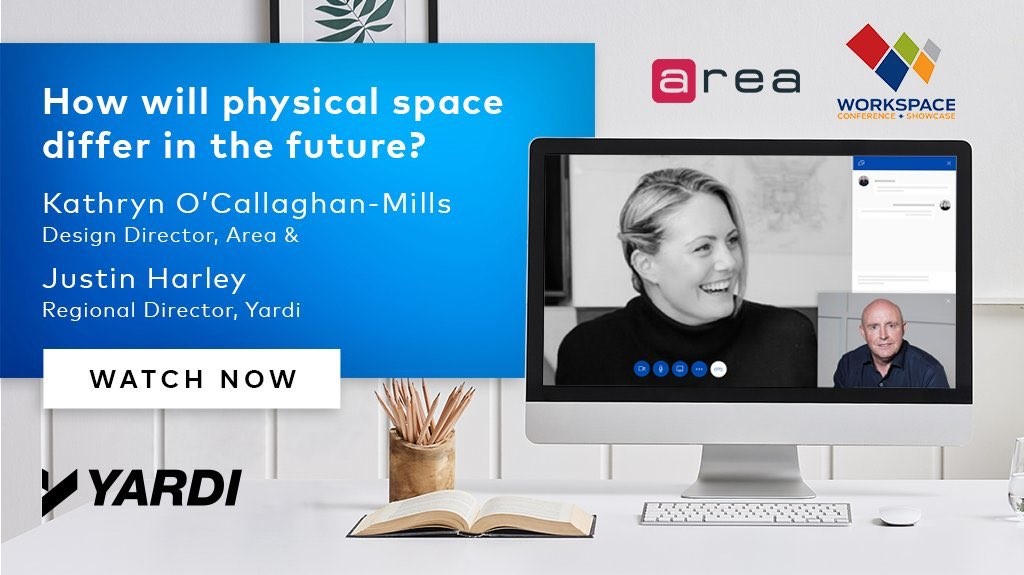When Yardi expanded to the Asia Pacific (APAC) market 15 years ago, it entered uncharted territory. Supporting a new team more than 11,000 miles away from the Santa Barbara headquarters required creativity, cultural savvy, a bold sense of exploration—and of course, technology. Since then, the Yardi Systems Pty Ltd. has established itself as a trusted leader in proptech. That trust has developed in part due to the marketing team which consists of three members serving from Sydney and Singapore. The team builds association relationships and develops the Yardi profile as trusted partners to and supporters of the real estate industry. This is done through content-rich materials such as white papers, articles, online events and APAC’s biggest initiative, the APAC-wide PropTech survey. The team is also responsible for translating Yardi’s global identity to the local markets. This includes marketing materials dedicated to the APAC region as well as sales and service materials. Big fish, growing pond Marketing manager Nina Feldman began her career with Yardi APAC five years ago. She was intrigued by working with a global organization that was relatively new to the region. “I get to work in the most awesome corporate environment that also functions like a startup – this gives me a whole heap of challenges but lots of fun, too,” says Feldman. Nina Feldman The APAC marketing team shifts through diverse workflows to accommodate the needs of the region’s sales and services teams. She finds it challenging to balance local agility with the unique demands of a global organization. It’s a challenge she tackles each day with the help of communication. “Communication, communication, communication. I’m a firm believer in one team, one dream. We’re all working for the same outcome. Whilst the ideal process never exists, I will always keep everyone in the loop so they feel informed and comfortable with whatever is happening or the timelines involved,” she says. Get in-depth insights on local best practices at the Mingtiandi Asia Logistics Real Estate Forum, sponsored by Yardi. Building cohesion while working thousands of miles apart Sasha Shatilova and Ian Khoo are marketing associates in the APAC team. Though both virtually joined Yardi during the pandemic, they felt welcomed and engaged from day one. Ian Khoo Sasha Shatilova “A highlight is definitely the first team lunch with Nina and Ian where each of us made a short PowerPoint presentation about ourselves. Very geeky, I know, but we have really bonded as a team through that activity,” says Shatilova. Khoo adds, “It has been a complete work-from-home environment which eliminates that warmth you get when you are in an office. Thankfully, my marketing team has been really warm and supportive and daily video calls with them has generated that sense of camaraderie that you’d get over office lunches.” Both associates were pleasantly surprised by corporate culture at Yardi. “There is an incredible support system here at Yardi,” says Shatilova. “Despite it being a very large company, the culture is surprisingly flat. You really feel that your ideas are being respected and your voice heard.” Khoo agrees. “I am able to feel a sense of community. Nobody shies away from extending a helping hand wherever possible, be it across the world in the U.K. or even locally in a separate department. There is a strong sense of collaboration within each project where everyone feels heard and feel like they are able to contribute their own ideas.” Interested in becoming a Yardi team member? Explore opportunities in your...
APAC Insights
That might surprise you
Australia and New Zealand were “underperformers” in Asia Pacific’s real estate market last year, with Sydney’s commercial transaction volumes down by 52%, Melbourne’s by 35% and Auckland’s remaining stagnant. But the countries’ overperformance in their handling of the pandemic could set them up for future success. Last week Yardi called in the experts to find out more. David Green-Morgan, Managing Director of Real Capital Analytics in Asia Pacific, Dr Sarah Hunter, BIS Oxford Economics’ Chief Economist for Australia and New Zealand, and Yardi’s Regional Director, Bernie Devine, joined us for the latest instalment in Yardi’s Executive Briefing Series for 2021. And their insights might surprise you. The pandemic hasn’t been a financial disaster While the world has witnessed the biggest economic downturn on record, the Australia and New Zealand experience was far from the “double digit” declines felt in some markets, Hunter said. This was thanks to “good luck and good policy”. Geographic isolation played its part, but both governments were also “aggressive leaders” in lockdown stringency, tracking, tracing, testing and other public health responses. Controlling the pandemic has allowed both countries “to normalise economic performance,” Hunter noted. Central banks have thrown the “kitchen sink” at the pandemic, with quantitative easing and a lower cash rate making it easier for people to borrow. Emergency support measures “have more than compensated” for loss of income from wage freezes, lower dividends or job cuts. On an “aggregate level” the pandemic “has not been a financial disaster,” Hunter observed. A “wave” of investment in infrastructure projects bodes well for the property industry, she added. Investment volumes took us back to 2016 Australia and New Zealand were “slight underperformers” in 2020, Green-Morgan said. Asia Pacific investment volumes, while down on the “record year” of 2019, were far from...
Market Insights
For Singapore and Malaysia
Last year was a tough one for commercial real estate in Singapore and Malaysia. But with record-breaking transaction volumes rounding out 2020 and Covid-19 vaccines rolling out at speed, there’s hope on the horizon. Yardi recently brought together some of the region’s brightest economic brains to unpack the data and unearth the trends. Here are their top five insights to help guide investment decisions in 2021 and beyond. Both markets are on the move Oxford Economics is predicting a GDP growth rebound of 7.1% in Singapore and 5.4% in Malaysia. Singapore is likely to return to pre-Covid levels in the second quarter and Malaysia in the fourth. But “growth recovery is dependent on health success” and is tied to each country’s efforts to contain Covid infections, warned Oxford Economics’ lead economist for Asia, Sian Fenner. The vaccine rollout is key to recovery, Fenner emphasised. In Singapore, just under 24% of the population has received its first dose. A 80% vaccination rate – and with it herd immunity – will be achieved in Singapore by the third quarter. While just 2-3% of Malaysians are currently vaccinated, 70% of the population will be fully vaccinated by the end of the year, Fenner said. Economic scars will take time to heal Rebound and recovery in both nations will be influenced by “economic scarring,” Fenner told Yardi’s engaged audience of property professionals. It will take time for businesses to repair their balance sheets and for the labour market to address skills mismatches, she explained. Singapore has followed a V-shaped recovery after an historic fall in GDP. “Singapore has almost recouped its loss in output and its GDP is now close to its pre-pandemic level,” Fenner’s colleague and Oxford Economics economist Sung-Eun Jung said. But this headline figure masks...
Hong Kong real estate
Ready to bounce back
Is Hong Kong is poised for a real estate resurgence? Two years ago, Hong Kong was the world’s third largest real estate market, trailing only New York and London. The twin challenges of protests and a pandemic have taken their toll. So last week, Yardi called in the experts for their take on Hong Kong’s future. David Green-Morgan, managing director at Real Capital Analytics in Asia Pacific, Tommy Wu, lead economist for Oxford Economics in Asia, and Yardi regional director, Bernie Devine gathered for the first instalment of Yardi’s 2021 Executive Briefing Series. Here’s why they think Hong Kong real estate is ready to bounce back. The macro indicators are positive Political unrest had already damaged Hong Kong’s economy prior to Covid-19, and a 6% contraction followed in 2020, Wu told Yardi’s engaged audience. But Oxford Economics is forecasting a strong recovery, with 4% growth in 2021, and then 2.5% annually out to 2025. All the macro indicators bode well, Devine added, pointing to the vaccine rollout, slowly improving retail performance and unemployment rate, as well as the city’s strong financial governance framework, which remains a source of competitive advantage. Office’s bumpy ride is over Political protests had a greater impact on Hong Kong’s commercial office sector than the global pandemic, Wu highlighted. Office prices fell during the protests, but the market is “bottoming out” and demand is returning. Green-Morgan agreed, pointing to recent deals struck at the 73-storey skyscraper at 99 Queens Road, The Center, which were “more or less on par” with 2018 prices. “Quite a few multinationals have been shifting business functions to other key cities in Asia – like Singapore and Kuala Lumpur – but they are still keeping their offices in Hong Kong,” Wu added. Oxford Economics expects the financial sector “to continue to thrive” and the tech sector, while small, will be a powerful engine for growth. Hong Kong remains “the gateway in and out of China”. Residential remains resilient While Covid-19 hurt the labour market, and unemployment currently sits at 7%, this has not affected housing demand, Wu said. Why is this? Most participants in the housing market are in the financial and other high-paying sectors, and these weren’t hit hardest by Covid. “The real impact on Hong Kong was the protests. In fact, Covid has had hardly any impact on property prices, when you take a high-level view,” Devine observed. Will migration, especially from those who hold British National Overseas passports, affect the housing market? Wu pointed out that the bulk of these migrants are young and footloose, but not asset-rich and were unlikely to be in the market for housing. Meanwhile land supply will remain “tight – at least over the next few years,” Wu added. Risk and rewards in restructured retail Retail could take some time to recover, and Oxford Economics does not expect to see a repeat performance of the bounce back in 2003, following SARS. This marked a golden decade for retail and China’s emergence as a “major force” in tourism. “This won’t happen again,” Wu warned. More than 80% of inbound tourists hail from China, but the falling price of luxury goods in China has eroded Hong Kong’s appeal as a shopping destination. Tourism is now at a “crossroads,” Wu added. Recovery in tourist arrivals will lag other nearby cities, and this will lead to “structural change” in retail. While Hong Kong has some of the highest rents in the world, and while yields have been “incredibly low” in recent years, some investors are beginning to take a punt on the return of Chinese tourism. “This is the big unknown,” but prices are now low enough “that people are willing to take a bet,” Green-Morgan added. Hong Kong stays strong “The last two years have been a real challenge for Hong Kong, but overall investor sentiment towards the city is becoming more positive,” Green-Morgan said. Despite...
GREEN on the Go
Facilitating Faster Leasing
GREEN Real Estate is in the process of building a best in class organization that supports the entrepreneurship, growth and development of the company. One of the pillars of such an organization is continuous insight in data availability of business information. In this context creating more seamless leasing processes was a goal for GREEN Real Estate, a real estate investor and developer with numerous projects in urban areas of the Netherlands. Being able to access current transaction activity, company communication and approval workflows from an electrical car outside the property? Well, that’s just a cool bonus. We recently caught up with Steven van Ginkel, Manager of Finance and Control for GREEN Real Estate, who says that use of mobile-friendly Yardi solutions for the company has been a game changer. The GREEN team works continuously to improve the combination of living, working, mobility and shopping in the Netherlands. They have used the Yardi platform since April 2015. Yardi was selected to improve data accuracy and transparency, simplify workflows, provide executive oversight and access to information from any online device. Earning and approving new deals Yardi Deal Manager, the most dynamic leasing solution on the market, enables asset managers and their internal and external brokers to reduce unit turnover, improve communication, work with prospects and provide managers and executives with all the real-time insight they need. It also makes it very easy to submit available lease options to potential new tenants. “Proposals to prospective tenants are literally one mouse click. This creates time to improve quality to the offer and communication between leads and the asset managers,” van Ginkel said. Changes are also faster when made within the system. We save between 30 to 60 minutes each time we make any contractual change when using Deal...
Improving real estate decisions
With machine learning
The human brain is capable of tremendous achievements. But what are its limitations in business transactions, specifically those involving property and real estate investment management? At what point do machine data-based systems make more accurate decisions than intuition? Human intuition certainly has its place. As Deloitte researchers Surabhi Kejriwal and Saurabh Mahajan have noted, “The [real estate investment and management] industry has long thrived on relationships, which is how many investors have traditionally gained access to unique information. Traditionally, most investors have combined this information with their gut instincts to make investment decisions.” But although intuition can be a useful tool, Harvard Business School Online writer Tim Stobierski cautions that “it would be a mistake to base all decisions around a mere gut feeling. While intuition can provide a hunch or spark that starts you down a particular path, it’s through data that you verify, understand, and quantify.” A team of McKinsey experts echoes this sentiment, noting that complex decision-making requires analysts to “sift through tens of millions of records or data points to discern clear patterns and place their bets with few supporting tools to help glean insights from that material.” By the time the data needed to determine a course of action is collected, compiled and processed, they note, “the best opportunities are gone.” There’s also the problem of “cognitive biases” that misguide decisions with information drawn from the wrong sources. Fortunately, Stobierski notes, “it’s never been easier for businesses of all sizes to collect, analyze, and interpret data into real, actionable insights” into portfolio health measurements such as revenues, debt, risk, occupancy and sales, along with property-level operations like energy consumption and accounts receivable. Ronald D. Marten, CCIM, writing in Forbes, adds that “CRE brokers who can tap into today’s sophisticated data tools can differentiate themselves and their core value proposition to clients. Knowing everything about a building by using flood maps, demographics reports, traffic counts, tenants and retailers … and more gives a potential buyer an accurate idea of what their ROI is going to be on day one.” What do machine learning algorithms in the real estate realm consist of? One example is combined macro and local forecasts that identify areas with the highest demand for residential housing. On another front, retail mall investors can combine operational data at the property level with sales data from mobile sensors, social media and physical store sales, then use machine learning algorithms to analyze consumer buying behavior. Similarly, commercial property tenants can compare rent rates across various markets to make more informed decisions and get into spaces faster. Data compiled from multiple disparate systems is complicated and prone to error. As a result, sophisticated software applications capable of collecting, processing and using data across the asset management lifecycle have been developed and brought to market. This technology, complemented by machine learning recommended actions, enable management of deals, budgeting, investor reporting and more in a single connected system. Developers seeking new parcels, for example, can use advanced analytics to assess the properties’ potential, property uses and even pricing, among other things. Asset managers can evaluate pipelines and match deals with investors, benchmark their properties’ rent against others in the area, tie capital calls to investment lifecycle data and generate reports. Property-level data collected within a centralized location enables everything from online tenant payments to reduced heating, cooling and ventilation costs and better oversight of construction projects. Kejriwal and Mahajan point out that “investors and managers can leverage analytics and AI across key steps in the investment life cycle, from deal sourcing to portfolio management to risk management. In addition, these technologies can help increase efficiency and effectiveness of operational processes, such as information integration, investment accounting, and reporting.” Real estate software technology holds massive potential to shift decisions from humans to machines. Assimilating all asset management information at the property and portfolio levels and makes it universally available can preempt...
BoKlok
Ikea’s fix for public housing
In the States, we’ve imported several great things from Sweden. Flat-pack furniture makes our rentals feel like home, and True Blood wouldn’t be the same without Alexander Skarsgård. But if you haven’t considered how Swedish imports could improve the quality and availability of subsidized housing, now is the time. The value of inexpensive housing Per a recent survey of 200 metros around the world, 90% of cities are considered “unaffordable.” Average housing prices are more than three-times median incomes in most neighborhoods. In the U.S. alone, The Harvard Joint Center for Housing Studies reveals that 38.9 million households are cost-burdened, spending more than 30% of their income on housing. For low income households, affordable rentals are hard to obtain. In the U.S., there are roughly 36 available affordable units for every 100 extremely low-income renter households. The National Low Income Housing Coalition reports a shortage of 7 million affordable rentals. The National Multifamily Housing Council and National Apartment Association (NAA) express a need for a more conservative 4.6 million new units by 2030. As city planners seek development and housing strategies that offer efficiency, quality and returns, they may find inspiration in Sweden. The BoKlok method could bridge the gap between what cities need, what cities can afford and what low-income renters can pay. Affordable housing, Ikea style BoKlok, a joint venture of Ikea and Swedish construction company Skanska, has successfully completed 11,000 homes throughout Sweden, Finland and Norway. The portfolio includes a senior housing collaboration with Queen Silvia of Sweden. BoKlok brings the IKEA model to senior and affordable housing. The company keeps prices low by focusing on high volume and complete supply chain management: it controls land acquisition, product development and manufacturing. Large volumes and ample repetition facilitate fast turnarounds and low production costs. The venture also controls...
YASC Global
Fall 2020 event recap
October 20-22, Yardi provided three days of education, training, inspiration and support to clients during the YASC Global conference. The expansion of the online event to attendees worldwide, building on a U.S.-focused event held in May, was well received. Over 20,000 attendees, representing more than 2,500 companies from 58 countries, took 45,000 courses over 72 hours. The event was hosted on the Yardi Aspire learning platform. Anant Yardi, founder and president of Yardi, delivered an introduction to the event and remarked on the rapid adaptations real estate professionals have made worldwide. “Last year we had six different conferences: Washington, D.C., San Diego, London, Dubai, Singapore and Sydney. They were festive occasions where we had the opportunity to meet and greet you. Today, things have changed,” Mr. Yardi said. “We now work from home. We no longer meet face to face, but through digital media. And as all of this is going on, we yearn for those good old days. I don’t know about you, but it sure is nice to meet face to face. And we look forward to the day when we can do that.” But to help deal with the “new normal” that the real estate industry now faces, Yardi has continued to expand its product suites to assist with remote business management, data transparency, social distancing, working from home and much more. These features augment the business and accounting features that have made Yardi the go-to technology provider for real estate over the last 40 years. Product spotlights During YASC Spotlight sessions, clients heard from Yardi executives about the development and progress of product suites, including Affordable Housing, Commercial, Investment Management, Multifamily, Senior Living, and Public Housing. There were also regional updates for international clients from Asia, Australia/New Zealand, Europe and the Middle East. “Through a single connected solution, we remain focused on providing a set of products and services that have a real impact on your property operations and property performance. These products help to create transparency and efficiencies in the interest of reducing risk, reducing expenses, increasing revenues and increasing property values,“ said John Pendergast, senior vice president at Yardi. Products highlighted for multifamily operators were RENTCafé Reach search marketing; Marketing IQ, a new marketing analytics product; RENTCafé Self-Guided Tours, which allows socially distanced property tours; RENTCafé Chat IQ, an automated marketing assistant using AI and machine learning; Maintenance IQ; Asset IQ; and the Procure to Pay suite. “There have been some dramatic changes. Remote working, asset distress, residents and tenants’ ability to pay rent, and a real focus on data have been part of our conversations with clients both big and small, operational or institutional ownership. The challenges are common across the different platforms and client perspectives,” shared Richard Malpica, vice president and general manager, Eastern region for Yardi, in the investment management spotlight. While different commercial real estate sectors have been affected uniquely, data visibility and the ability to access operational data have been especially important to investors and operators alike. The Investment Management product suite provides tools to deliver data transparency, risk exposure analysis and real time reporting that investors are seeking now. “Though we have incredible optimism about the next 18 months, it is important that we acknowledge the hardship that many of you have faced in a personal and professional manner,” said Rob Teel, senior vice president at Yardi, in the commercial product spotlight. “I want to assure you that Yardi has passionately contributed philanthropically and to professional trade organizations to help with a global rebound from this crisis.” Commercial clients learned about the latest updates to the Yardi Commercial Suite, including Yardi Elevate, which sits on top of Yardi Voyager and provides operational tools to drive performance and gain operational visibility. Leasing, forecasting, deals, retail tenants and construction projects all have specialized management modules and reporting oversight within Yardi Elevate. Its real time informational visibility has been especially beneficial...
Digital Services
For Europe’s house hunters
Residential property investors speeding up digitalisation due to the corona pandemic is a positive development, says Terrence Wong, Yardi regional manager for Europe. However, the main reason for going online is that very soon, potential tenants will expect and demand digital services. ‘The result is happy tenants, more efficient business processes and greater profitability.’ Wong was one of those taking part in the Yardi roundtable on the use and the necessity of the further digitalisation of clients’ journeys. In the Netherlands, the leasing cycle is frequently still very laborious, says Wong. ‘Tenants don’t meet their property managers until the leasing cycle starts. Property managers are often hard to get hold of. The perception of a potential client who spends 20 minutes in the queue, is not put through and has to call back a few days later is obviously far from positive. The new tenant subsequently has to print out lots of documents to be signed, then has to pass by to view the property, and then again to sign the contract. And all this exclusively during office hours.’ Moving faster Digitalising the whole leasing cycle, both for the tenant and our own organisation, cuts out a lot of the red tape. ‘See it as a service to the tenant. Tenants want to do it all themselves through a smart app, without being tied to office hours or the property manager’s agenda. And property managers, too, want to move fast. Having tenants submit all their details digitally and allowing them to take care of many of their affairs themselves requires fewer internal employees. Furthermore, complaints can be processed and dealt with quickly, with ongoing automatic updates. This leads to happy, well-informed tenants and an efficient internal completion procedure.’ High tech and high touch According...
Outstanding service
Portals for real estate tenants and residents
These days it might be easy, perhaps even understandable, for those in commercial real estate to downplay the relationship of tenant interaction to asset performance. After all, the COVID-19 pandemic has largely evicted workers from their offices while retail continues to endure e-commerce’s expanding presence. But property owners shouldn’t lose sight of how important ongoing communication between owners and their tenants is for attracting prospects, retaining tenants and operating efficiently. Erin Wicomb of San Diego real estate investor Mavrik Investing has noted that “customer retention is often an underestimated factor in real estate success and not given nearly enough attention. Plenty of effort is spent finding and marketing to new tenants, but investors and landlords often neglect to take care of existing customers and make them happy.” Focusing on the residential market, the U.S. National Multifamily Housing Council noted in a 2018 report titled Disruption: How Demographics, Psychographics and Technology Are Bringing Multifamily to the Brink of a Design Revolution that “tomorrow’s renters’ needs and wants are shaping up to be so very different in any number of ways that the industry must begin thinking about how to adapt or risk facing a disconnect with their future customers.” In a similar vein, a commercial property leasing guide published by Colliers International declared that “the number one reason that an owner’s relationship with his or tenant falls apart is lack of communication – and this is often the responsibility of the property manager,” adding, “You can have the best customer service on the planet, but when property management breaks down through lack of foresight or poor communication, that one action can strike a fatal blow against all the goodwill you had built up.” Residential tech demonstrates success How do residential property owners avoid that fatal blow and take care of their residents, maintain communication and build goodwill? Many have embraced portals as the answer. They are a valuable tool for connecting residential community members to the services they might need any time of day or night. Seamless access to contact, lead, lease, resident and property data lets staff focus their attention on higher-value operations. Advanced property management technology platforms host portals as part of an end-to-end system that performs all prospect and resident services in the rental lifecycle, from initial contact to move-in, lease renewal and move-out, as well as timely communication. New advantages for commercial real estate Commercial real estate operators might want to consider emulating their residential counterparts by implementing portals and apps that deliver tenant services much more efficiently than is possible with telephones and emails. Property managers, for example, can easily dispatch announcements, emergency plans and other vital information through a portal. Tenants, for their part, can record maintenance requests and attach audio and photo documentation. Although millennials seeking cutting-edge amenities in their living spaces are the most visible advocates of property technology innovations, commercial real estate is undergoing its own generational shift. The younger workers among the sector’s cohort similarly expect the convenience of online and mobile self-services such as document access, electronic payments, maintenance requests, retail sales data entry and concierge services. Ideally, portals are built into a property management and accounting platform that centralizes financials, operations, leasing, maintenance management and other operations in a cloud-hosted database. Relieved of manual tasks such as the recording of tasks, property owners can concentrate on closing leases, maximizing rental income, increasing conversions and renewals, and ultimately enhancing their assets’ value. Some property management platforms leverage artificial intelligence, machine learning and chatbots to combine historical unit-level performance data with market outlooks. The resulting portfolio-wide data and prescriptive recommendations help managers make informed decisions that cut costs and elevate asset performance. Portal technology offers a human touch that contributes measurably to tenant satisfaction, a key element of retention and a property’s reputation in the marketplace. As Mavrik Investing’s Wicomb advises, “From the start, develop and provide channels of open...
Fostering Leadership
Neharika Jha, Global Solutions
Like many engineering students, Neharika Jha wasn’t completely sure about her concentration. At the time, she chose computer science engineering. “Not paying too much attention to computer courses taught in school didn’t help initially,” she laughs. But with time, Neharika realized how computer science solved a variety of real-life consumer and business problems. “I realized the positive impact I could have with my learned skills,” she says. “A smartphone today is a million times faster and more efficient than the computers used for the Apollo 11 mission, enabling our first step onto the surface of the moon. This thought of connecting present with past and wondering where it would take us in the future keeps me very excited about the path ahead.” Her knowledge of the computer sciences helped her land a job, but her leadership skills have helped her forge a career and create a legacy at Yardi. Helping clients prepare for the future Neharika joined Yardi immediately after receiving her degree from Pune University. It was 2008, the peak of the financial crisis, and she considered herself fortunate to secure employment. A software company that hired during a recession bode well for her and the organization. “I believed that the company must have very sound fundamentals to be recruiting in those times,” she recalls. “And 11 years later, I can’t thank Yardi enough for the opportunity to join this wonderful organization and be a part of its growth both as a contributor and a beneficiary.” Neharika is currently a manager for an International Practice Global Solutions team. The unit builds, manages and strengthens Yardi’s relationship with some of its biggest clients including Cushman & Wakefield, CBRE and Prologis to name a few. “As a team, we promote the continuity of the clients’...
Dementia Care Reimagined...
Ikea + H.M. Queen Silvia
Two unlikely forces are improving dementia care in Sweden. A member of the royal family is collaborating with a ready-to-assemble home supply store. Together, they’ve reimagined senior housing development in a way that is affordable, sustainable and chic. The collaboration couldn’t have come at a better time. By 2040, nearly one in four Swedes will be 65 years or older. While long life expectancy is a good problem to have, the government desperately seeks affordable ways to fund care for its aging population. Queen Silvia has taken a personal interest in the nation’s senior care. After losing her mother to Alzheimer’s, she became more involved in dementia care initiatives. BoKlok, an affordable and sustainable housing partnership between Ikea and Skanska, captured her attention. The three powers began a multi-decade endeavor to develop an affordable approach to housing the nation’s elderly while keeping quality and sustainability at the forefront of their efforts. SilviaBo: affordable, sustainable housing Together, BoKlok and Queen Silvia created SilviaBo, senior housing developments that rose to the demands of affordability, quality and comfort. They are designed to allow seniors to age in place rather than nursing homes. “To take care of elderly people, that cost is exploding,” BoKlok CEO Jonas Spangenberg told CNN Business. “It’s much cheaper for society and the public to give them service back home.” To date, SilviaBo includes 11,000 prefab homes with communities in Sweden, Norway and Finland. Their success has relied on the Ikea model for mass production. To keep costs low, the homes are produced in high volumes in warehouses, succinctly packed and then shipped to the site. Ikea and Skanska also took responsibility for the supply chain from start to finish: land acquisition, production, assembly, marketing and leasing all take place under the BoKlok umbrella....
Yardi Opens Paris Office...
Expanding in France
Developing investment and property management software since 1984, Yardi, world leader in the real estate technology sector, has entered the French market with the opening of a Paris office. Richard Gerritsen, regional director for Europe, explains what the company intends to bring to the French real estate sector in this interview, which was first published in Business Immo Europe. Business Immo: What is Yardi proposing to the French real estate sector? Richard Gerritsen: We don’t consider ourselves a software company anymore, but a technology partner that provides solutions and services to support the activities of investment and asset managers. We provide the dashboards, the reports and the data that our clients need to make their decisions, which means we provide more than just software. Where we traditionally focused on the back-office activities, we are now completely focused on providing insight on the performance and the health of the portfolio, whether it is more on the day-to-day asset management functions such as lease or vacancy levels, or at a higher strategic level, on the performance of the assets. BI: Yardi has opened an office in Paris. What is your plan for France? RG: Our clients have properties in 29 countries across Europe, where we have seen an increased interest in high-quality modern technology helping asset managers. Over the last two years, we have spent a lot of time in France, which is now the fastest-growing country on the continent for the adoption of Yardi technology. Because we have high expectations for the continued growth of Yardi in France, we feel the time is right to open an office in Paris. BI: How does Yardi differentiate itself from its competitors in France? RG: Traditionally, the French real estate market has been served with software firms that...
Data Drives Success
Yardi EU Perspective
Real estate asset management firms are facing extraordinary challenges in the aftermath of the COVID-19 outbreak. Some may emerge from the crisis relatively unscathed. Others might not be so fortunate. Social distancing requirements and work-from-home strategies, prompted by COVID-19, have rapidly amplified the importance of operational and financial data, its accessibility and team connectivity. What matters almost more than the data itself, however, is the means of obtaining it efficiently and using it effectively to benefit clients, investors and other stakeholders. That’s not easily done without the right technology. In the world of real estate asset management, data comprises information that reveals a portfolio’s health, such as revenues, debt, risk, occupancy and sales, along with property-level operations such as energy consumption and accounts receivable. Two distinct groups need this data: operations groups tasked with effective management of the portfolio, property and tenants; and those who focus primarily on investors along with the organisation’s tactical and strategic issues. Some systems compile data from multiple disparate systems, making usable data a moving target. This approach – which prevailed in most property management industry vertical markets until the last couple of decades — is complicated, cumbersome and prone to error. For asset and operations managers to remain nimble, act proactively, anticipate and react decisively, they need a way to stabilise and gain instant access to it. That’s why connectivity is the key value proposition in asset management and the reason that sophisticated yet user-friendly asset management software applications that collect, process and apply such data across the asset management lifecycle are increasingly relevant. All user groups benefit when the data their business depends on is readily available. Fortunately for them, today’s asset management technology platforms assimilate all asset management information at the property and portfolio levels and...
Innovating in Industrial
Delin Property goes out-of-the-box
The traditional image of a warehouse is that of a windowless box with little visual appeal, inside or out. That perception is giving way to new designs that use technology to integrate efficiency with safety and opportunities for constructive workforce interaction. Delin Property, the leading pan-European real estate investment developer in the logistics market, is on the leading edge of that transformation. Delin’s status as both a logistics real estate developer, asset manager and investor provided a vantage point for envisioning a new type of storage facility. “We’ve always tried to be on the forefront of design and technology, and to use that motivation to create a better experience for owners, tenants and investors,” says Bart De Sitter, development director for Delin Property’s operations in the Netherlands. Elevating the human element Delin Property began its redesign initiative by recognising that labour costs are a warehouse’s largest operational expense. That made improving the experience for both blue- and white-collar workers the company’s top priority. “A grey box with no windows isn’t sufficient today. You have to create a pleasant workplace to attract and retain the 1,000 to 1,500 workers who staff a warehouse, many of them millennials who have higher expectations of workplace amenities than previous generations,” says Jay Lelie, asset and leasing manager in the Netherlands. A design along these lines incorporates features such as windows, green spaces and terraces for breaks and meals. “Windows really make a difference when you’re in there for eight hours – not just to let natural light inside but to let workers see outside. Our clients tell us this feature really helps reduce absenteeism, illness and turnover,” according to Lelie. Along with creating an aesthetically desirable space, Delin Property’s new approach to warehouse design sought to end the sector’s historical workplace separation of white collar and blue-collar workers. “As interactions between managers and their workers become more complex in the e-commerce environment, working closely together onsite becomes more important. We wanted to create an environment that puts a premium on natural interaction and ends separate entrances and canteens and other arbitrary physical or mental barriers,” De Sitter says – although, of course, this scenario can’t be fully realised as long as COVID-19 remains untamed. Delin Property also put a premium on safety, plotting car and delivery truck routes well away from pedestrian traffic. Other challenges in the redesign included maximising parking spaces in tightly constricted urban locations. Using tech to strengthen client bonds Back when Delin Property was solely a property investor, it outsourced most of its direct contact with clients. “That was a logical choice at the time, but it ended up making us too remote from tenants and created too many steps between us and them,’ De Sitter said. “We wanted to manage the communication stream in a way that lets us focus on our relationship with clients rather than on administrative tasks and compiling reports.” Toward that end, the company has adopted advanced real estate management software solutions from Yardi that enable execution of multiple business operations from a single connected platform and promote staff efficiency and client service. Delin Property’s invoice processing, for example, will be paperless for tenants and driven by automated workflows all the way to vendor payment. Similarly, automated project management will help keep the company’s construction projects on time and on budget by providing real-time views of data across multiple capital projects. Meanwhile, tenants will have the convenience of making payments, communicating with Delin Property, accessing documents and submitting maintenance requests online or with a remote device. Other solutions will automate preventive maintenance and other elements of facility management while housing records for equipment and maintenance in one database. A vision rooted in simple changes All of these design and technology elements combine, according to De Sitter and Lelie, to create a future vision that encompasses “a high-end office with a facility behind it that...
Electronic Invoicing
Benefits for real estate
Consider how much of your everyday business can be done without paperwork. If you want to fly, for example, you can do everything from booking your seat to gaining clearance to board the aircraft using just your cell phone. In contrast, many national and multinational real estate companies still generate, circulate and approve invoices using paper and manual routing. This highly inefficient process is costly, time-consuming and contrary to prevailing environmental sensibilities. A paper invoice can cost as much as € 4 to generate and route by air and ground transport. The cost of processing it can set the recipient back anywhere from € 15 to € 30 because he or she often has to rekey the information into his or her own database, then route it to multiple approvers. There can be dozens of touchpoints, each one of which consumes resources and presents opportunities for error. And that’s just one document. Multiply this sequence by the hundreds or thousands of vendors and partners some real estate firms deal with. This approach to invoice processing doesn’t just seem outdated with the potential to drag a business down – it is. Payables made easy Real estate companies’ profit margins might remain slender through the COVID-19 era. Besides that, tenants, investors, communities and regulators are imposing increasingly stringent environmental performance standards for businesses. These developments might inspire real estate companies in Europe to consider replacing the manual steps – and paper – in the accounts payable process with advanced software applications that scan invoices into electronic files, route them to approvers and pay suppliers with electronic funds transfer. This approach can sharply reduce costs as well as the material and energy required to create and move paper invoices to their various destinations. In fact, savings of...
Yardi Think Tank
Build to Rent Post COVID-19
Yardi and Property Week recently invited experts from across the build-to-rent sector to take part in a digital debate on the key issues facing the market in the wake of the coronavirus pandemic. The consensus was that despite the challenges posed by the outbreak, there is also an opportunity for BTR to move forward and evolve Michela Hancock Managing director, Greystar Europe Justin Harley Regional director, Yardi Systems Hannah Marsh Co-founder & marketing director, HomeViews Sanjeev Patel Managing director, PPP Capital Kevin Watson Operations and commercial director, Platform Simon Creasey Contributing editor (features), Property Week (chair) Earlier this month, in the latest in the Yardi Think Tank series, Property Week contributing editor Simon Creasey chaired a discussion with key figures in the UK build-to-rent sector on how Covid-19 has affected BTR and the factors driving innovation for investors and residents. Also up for debate was how the pandemic might affect future BTR development. Simon Creasey: What impact has the Covid-19 lockdown had on your operations so far? Kevin Watson: The main impact has been on amenities spaces, which obviously have been closed now for a significant amount of time, and that’s clearly a key part of the value proposition of BTR. On the operations side, the thing that’s been really good to see is the transition to virtual and video viewings and other tools that enable engagement with residents. I think we’ve all been pleasantly surprised at how a lot of people both from the operator side and also from the resident’s side have taken to that. We still have some way to go to make those virtual viewings as interactive and as effective as a face-to-face viewing, but it’s been great to see that come through. Michela Hancock: We’re all kind of dealing...
Meeting the Need
YVVP Steps Up During Pandemic
Yardi Vasti Vikas Prakalp (YVVP), Yardi’s dedicated corporate social responsibility project in Pune, India, supports NGOs and implements direct interventions in urban communities (vastis) of Pune city. As the global COVID-19 pandemic has impacted India severely, YVVP has pivoted to help. Normal field visits to the vastis halted when a lockdown to prevent COVID-19 spread began in late March. The CSR team switched to using virtual platforms to stay connected with beneficiaries and stakeholders, to understand the situation on the ground and address unprecedented issues. This has presented various challenges. Many vasti residents do not have smart phones, internet access or resources to recharge phones. “Lockdown restrictions in congested spaces combined with loss of jobs have created high levels of fear, anxiety and frustrations among family members, in addition to hunger,” said Bharati Kotwal, head of CSR at Yardi Pune. “Our stakeholders in vastis, such as community mobilizers, sanitation committee members and youth leaders have helped us to identify the neediest families and do what we could to relieve some of the distress.” Aiding with sanitation and sustenance needs YVVP has provided relief to vasti residents in two significant ways during lockdown: Provided dry ration kits (food and grocery items) to families identified through the YVVP field team and NGO partners. Supplied masks, sanitizer and sanitary pads to those isolated in shelters located in municipal schools. “We provided dry ration kits to over 2800 households in three months through NGOs or by procuring items directly and distributing them ourselves,” Kotwal said. “Though NGOs, foundations, individuals and Pune Municipal Corporation (PMC) were providing similar help, we could reach those who were left out because of our connections in the vastis.” Keeping community toilets clean and functional is one of the largest efforts of YVVP. The...
Global Perspective
Gerritsen talks to Vastgoedmarkt
For Richard Gerritsen, regional director of European sales at Yardi, leadership is all about creativity. “Technology changes the world. We play our role in this as technology partner, but it is also about finding the right balance between costs and benefits. We try to encourage our sales teams to define the best solutions for our clients. At the same time, it is important that our salespeople, and all other staff, feel comfortable in their own skin.” Dutch real estate publication Vastgoedmarkt recently spoke to Gerritsen about work/life balance, the need to learn from successes and failure, and the willingness not to think in just commercial terms. The interview below is reprinted with permission. Difficult circumstances Gerritsen notes that many of his team members are finding living circumstances difficult due to the COVID-19 pandemic. “I live outside the city and, after a day full of video conferences, I hop on my bike and I can be out in the countryside in just a few minutes. By the time I return home, I feel refreshed and have recharged my batteries.” “It’s important to recognize that we have young people working at the company who have an urban lifestyle. They live in apartments in areas where there’s normally plenty going on in the evenings, and they’re used to spending a lot of time socializing away from home. Their lives have been enormously diminished by the crisis; living between the bed, sofa and dinner table. Some of them are finding it a real struggle. Set against this, our work is about bringing across a message with great energy, passion and enthusiasm. The combination is hardly a recipe for success. It’s very difficult to know how to help them in this situation.” For Gerritsen, leadership in these times becomes...
Aspire Expands
Now Available for Middle East Clients
Yardi Aspire, a dynamic on-demand learning management platform is now available to Yardi clients in the Middle East. Yardi Aspire, formerly known as Yardi eLearning, offers online courses and live webinars in areas ranging from software skills and compliance to company policies and custom career development. By hosting all of an organization’s training-related course content and documents in a centralized platform, Aspire reduces the time needed to create, maintain and administer courses. Automated reporting functionality tracks learning progress and organizational trends. Recognizing the critical need for virtual training and the unique challenges faced by learners who are practicing social distancing, the Yardi Middle East support team and the Yardi Aspire team have worked to deliver creative learning options developed specifically for our clients in the Middle East. We’ve packaged the training style and product expertise of Yardi’s Middle East software support team into interactive, mobile-friendly courses in the Yardi Aspire Learning Management Solution. We are excited to announce the release of a new Middle East collection of online learning courses that ready to be delivered directly to you and your employees. We’ve taken the liberty of bundling our courses into role-specific learning plans that deliver effective training to the right individuals. “Aspire offers property managers a budget-friendly way to establish an immersive, intuitive training program very quickly and easily,” according to Neal Gemassmer, vice president of international for Yardi. “The platform’s role-based learning plans put the right topics in the right hands. The convenience and efficiency of Aspire advance employee career development and therefore organizational success.” This new partnership was conceived with one specific goal in mind- to assist clients like you with essential software training during a time when live classroom training is simply not an option. This is just one of many...
Change for Good
Tech can help, says Gerritsen
Editor’s note: the following article featuring Yardi’s Richard Gerritsen was originally published in the Dutch real estate publication Vastgoedmarkt. Reprinted here with permission. The coronavirus outbreak is a powerful reason to take the digitisation of many work processes to a new level. “There is both a need and a desire for online residential leasing in a socially distanced world,” states Richard Gerritsen, regional director of European sales at Yardi. The technical tools to do so are already available. According to Gerritsen, the property world rarely views technological transformation in strategic terms. “Clients want operational solutions. Vendors respond by making apps available for very specific purposes. The use of tools like these undoubtedly has added value, but it doesn’t change the way we work. Whether you are a property manager, asset manager or fund manager: I firmly believe the use of technology should form part of your business strategy. A more fundamental consideration of the potential of proptech is often lacking, but today we have an urgent incentive to change that.” Old habits die hard Gerritsen is referring to ways of doing business that have been in place for decades. They may be comfortable and familiar, but they’re not best practices. “Technology is changing the way we live in big ways. The coronavirus has resulted in us getting used to different ways of communicating with one another. But in the property world, things still go on much as they always have. We need to make strategic decisions now to be prepared for the future.” Yet, Gerritsen believes the technology to revolutionise the management of residential and other types of property is already available. He points to the United States, where it’s possible to arrange a property viewing at any time of the day without an...
Flexspace Perspectives
New bitesize videos
Yardi is excited to present a series of bitesize insight videos in partnership with Property Week, ahead of Workspace 2020. This series of interviews gathers perspectives from all corners of the flexible workspace industry, reflecting on the uncertain times that we have found ourselves in during recent months. Justin Harley, regional director at Yardi, captured insights from design company Area, flexspace operator Uncommon and data analytics company The Instant Group. In the last of the series, Harley also summarised Yardi’s technology outlook. How will physical space differ in the future post-covid-19? First to take the Zoom stage, was Kathryn O’Callaghan-Mills, Design Director at Area. Harley jumps straight in with the burning question, “how will physical space differ in the future post-Covid-19?” “The beauty of workspace is that it is so flexible, and the key point of our industry is to give the user a flexible experience,” comments O’Callaghan-Mills. “Operators need to consider two main elements; people and space.” O’Callaghan-Mills explains how operators can make an impact by considering these two pertinent points, including enabling social distancing with space management and rotating people within those spaces. Staying true to the bitesize theme, O’Callaghan-Mills promotes a digestible way of thinking with a ‘the now, the next, and the future’ mindset. With ‘the now’ comprising of immediate measures you can take; ‘the next’ acts as a hybrid of the immediate measures and new normal measures; and ‘the future’ which leverages on the innovation and technology investments you make today. How will the landscape of Flexspace change? Harley also spoke to Chris Davies, Director of Uncommon. Davies expressed that “the traditional faceless office is dead.” And how “the real estate industry needs to support the needs, amenities and service demands of flexspace clients.” “Covid-19 has fundamentally changed the landscape – it’s sped up pre-existing trends such as looking after staff. Staff are the most important part of any business and make up 60-80% of most businesses and flexible office space is the corporate enabler.” Davies explained that office users want a healthier workspace and activity-based working – something that the flexspace market has a hold on over traditional office. Davies expressed how corporate companies will continue to absorb the majority of flexspace market. In 2019 40% of occupiers were corporations – Davies only sees this expanding. Companies signing 5-10-year lease agreements will be a thing of the past in Davies’ opinion. “why wouldn’t a business use a better environment for their staff?” How will the demand for flexible workspace differ post-Covid-19? James Rankin, Head of Research for The Instant Group, gave some insightful perspectives on how the demand for flexspace might differ post-Covid-19. Rankin broke his summary down into three main points explaining that demand for corporates will increase, diversification of location of the office portfolio will be prevalent, and the entrepreneurial sector will flourish. Rankin shared insights from a recent research project conducted by Gartner; “Flexspace operators are moving away from the reactionary thought process that Covid-19 has seen them take, and are now moving to make more strategic decisions about the future of flexible workspace. They are looking to reduce costs, make efficiencies and increase the flexibility of their portfolios as a whole.” Diversification of the office portfolio will be ever more important Rankin explained, “we’ve seen a large number of companies look at how they can expand out of large metropolitan, central hubs.” Rankin explained that the supply isn’t there yet in suburban markets. “We’ve seen a spike in interest for flexible workspace. 5 out of our top 13 global coworking markets are now showing interest levels higher than pre-Covid-19. The bounce back is starting to speed up.” Technology Insights & Predictions Last but not least, Harley closed the Bitesize series with a summary of his predictions and insights that Yardi has taken from clients in the industry. “The future of flexible workspace is healthy and positive,” Harley states. Harley...
Yardi Proptech Insights
With Delin Property
In the latest edition of Yardi Proptech Insights, Yardi regional director Richard Gerritsen speaks with Bart de Sitter and Jay Lelie of Delin Property about the company’s efforts to design innovative warehouse spaces that are efficient and functional as well as attractive for workers. With the growing need to attract and retain ecommerce employees for order fulfillment, warehouse spaces with natural light and employee-friendly amenities like lunch and break spaces are more important than ever. Interconnected spaces for warehouse activities and offices for managers and admin staff are also a priority. “We are hearing from our clients that retention of personnel is becoming more and more difficult, and we want to help our clients make a difference for their workforce, and help their employees be proud when they arrive at work,” said de Sitter, the company’s development director. That means moving away from boring, box-like industrial development norms. “In our designs we put the labor force first, creating a warehouse that provides a better workplace,” said Lelie, asset and leasing manager. Design schemes show massive windows, creative office integrations, and terrace-like areas for worker breaks. The company invests and develops industrial space in the Netherlands, UK, and Spain. Use of forward-thinking PropTech is also important to Delin Property, which continues to adapt and improve its technology management platform using Yardi products. Improving communication with tenants, on site safety and automating business processes have been two PropTech priorities for the company, shared de Sitter and Lelie. Watch the video below for more PropTech insights from this valued Yardi client. Learn more at...
Dubai Asset Management
Yardi improves customer service
More than 100,000 Dubai residents rely on 10 housing communities, ranging from studio apartments to luxury villas, owned by Dubai Asset Management (a subsidiary of Dubai Holding). The subsidiary of Dubai Holding developed its portfolio of 20 million square feet of leasable assets by providing the best customer experience in terms of product, pricing and location, and resident services. Maintaining outstanding customer service as communities, headcount and staffing grow larger isn’t easy. Company leaders realized that retaining stature as Dubai’s premier provider of residential property required better technology and increased staff efficiency in the form of real-time property availability, online leasing, rent payments and resident self services, along with 24/7 online and mobile access to account data. Achieving this goal required a technology platform capable of managing the entire residential lifecycle. In 2015 Dubai Asset Management adopted Yardi Voyager as its property management and accounting platform. Yardi Voyager centralised Dubai Asset Management’s operational, financial, maintenance management and compliance data on a single connected solution. With information easily available online and via remote devices, Dubai Asset Management can show prospective residents real-time apartment unit inventory, including floor plans, which helps the company close leases faster and achieve occupancy targets. The easy access to information also helps the company make and implement better-informed decisions. The full integration of Yardi Voyager with RentCafe and Yardi Maintenance further enhances Dubai Asset Management’s resident service and staff efficiency. Units available for lease are displayed online as soon as they become available, enabling faster unit turnover. Residents have the convenience of making rent payments online, and the company’s maintenance staff can manage work orders in the field without returning to the office. Leasing agents can close deals as easily in the field as in the office. The portfolio-wide data transparency enabled by Yardi Voyager also enhanced reporting efficiency by reducing the time staff members spend manually compiling data. “Yardi Voyager reduces the friction of moving in, moving out, contacting maintenance and paying rent. These benefits make our communities more convenient and satisfying for our residents and solidifies our reputation as a leading residential services provider in Dubai,” said Mohamed Roushdy, head of technology for Dubai Asset Management. Learn more about Dubai Asset Management at dubaiam.ae/. Learn how Yardi serves property management companies across the Middle East at...
Next Steps
For international proptech
Yardi’s vice president of international, Neal Gemassmer, recently spoke with the UK Proptech Association (UKPA) about the future of international proptech. Their conversation is reprinted below. Yardi started out as a small software start-up. Now, moving towards Yardi’s fourth decade, how have you seen technology evolve? Gemassmer: A lot has changed since 1984. Since then, Yardi’s technology road map has delivered consistent innovation as we remain focussed on meeting the evolving needs of the real estate industry, and helping our clients serve customers and improve business outcomes. As one of the earliest property management software start-ups, Yardi was founded on core property management and accounting. Since then, we have greatly expanded our range of products and services. Being one of the first real estate technology companies to transition to the cloud, our SaaS model has proven to be hugely successful. With a focus on mobility, connectivity and efficiency for users, we now provide a unique role-based ecosystem of solutions and interfaces for key positions in real estate management. Whether you’re an asset manager, investment manager, property manager or marketer, Yardi offers a range of solutions that are intentionally designed to connect teams across the entire real estate lifecycle, while leveraging a single source of data. Yardi now employs over 7,000 people worldwide and are active in over 80 countries, serving clients that invest in and operate a wide variety of real estate asset classes, from fund and asset management, commercial including office, industrial and retail, coworking and flexible workspace to residential including build to rent, PRS and student. Can you share any insights into the latest innovations at Yardi? What are you most excited about in the product pipeline? Gemassmer: We have creatively consolidated Yardi’s technology solutions into four main principles: Fully connected real estate management...







